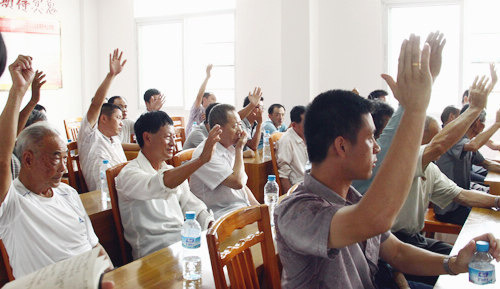|
 |
|
RAISING QUESTIONS: Voters in Shazhouba Village in Ruijin, central China's Jiangxi Province, meet people's congress candidates on June 20 (GAO XUEYU) |
Ninety-year-old Beijinger Dou Yuhong received his 16th voting certificate this year. After casting his ballot to elect deputies to the local people's congress at a polling booth in Changping District on November 8, Dou carefully stored the certificate with his most treasured possessions.
Having lived in Xiaozhai Village in Changping's Shahe Township for 54 years, Dou has collected all the voting certificates he has received. In 1953, he participated in the country's first election of people's congress deputies.
"The certificates are records of my exercise of the political right of a citizen," Dou said.
On March 8, 2010, about 3,000 lawmakers attending the Third Session of the 11th National People's Congress (NPC), China's top legislature, listened to a report by Wang Zhaoguo, Vice Chairman of the NPC Standing Committee, on a draft amendment to the Electoral Law.
The amendment had been deliberated on two occasions before it was tabled to the NPC full session, at bimonthly sessions of the 11th NPC Standing Committee in October and December of 2009. It was finally ratified by the NPC on March 14, 2010, abolishing the difference in representation between rural and urban lawmakers.
Before the amendment went into force, each rural people's congress deputy represented four times more people than an urban deputy. When the Electoral Law was first adopted in 1953, the difference was 8:1.
"The modification means rural residents have obtained equal rights in people's congress elections, which will promote the realization of the 'principle of equality' stipulated in the Constitution," said Han Dayuan, Dean of the Law School of Beijing-based Renmin University of China.
In many experts' eyes, the latest amendment to the Electoral Law also ensures equal representation among regions and ethnic groups, as it stipulates "every administrative area, regardless of the size of its population, should have the same base number of deputies," and "ethnic groups with the smallest population must also have one deputy."
During the review of the amendment of the Electoral Law, many legal experts called for realizing equal representation in people's congresses to rural and urban people. Some also suggested adjusting the difference from 4:1 to 2:1 as a transition.
Qiang Shigong, a professor at the Law School of Peking University, said, "The one-step realization of the equal representation is simply a positive legal result brought about by China's rapid urbanization following the reform and opening up."
Since 1978, when the reform and opening-up policy was introduced, China's rural-urban population ratio has changed significantly.
By the end of 2008, China's urban residents had totaled 606 million, or 45.7 percent of its total population. It is expected that 50 percent of Chinese people would live in cities by 2015.
Meanwhile, many regions in China are reforming their household registration system, or hukou, trying to eliminate the difference between rural and non-rural hukou holders.
"These trends have laid a basis for holding people's congress elections using the same ratio of deputies to the represented population in urban and rural areas," Han said.
In 2007, Zichuan District in Zibo City, east China's Shandong Province, became the first region in the country to adopt an equal ratio of rural and urban representation in electing deputies to grassroots people's congress.
"The main motivation was the changes that had occurred in local population composition," said Si Yanhui, former Vice Chairman of the Standing Committee of the Zichuan District People's Congress. Si admitted that the practice at the time encountered a big obstacle—the lack of a legal basis.
"We had to resort to the Constitution, which stipulates that all people are equal before law," said Xu Qian, a worker with the Standing Committee of the Zichuan District People's Congress.
In Zichuan, more deputies from rural areas strengthen the representation of farmers in the local lawmaking body.
When piloting the new election rule, it was stipulated in Zichuan that the number of deputies from among workers, farmers and intellectuals should surpass the numbers elected to previous people's congresses.
The amended Electoral Law also stipulates that among deputies to the people's congresses at all levels, there should be an appropriate number of grassroots deputies, especially from among workers, farmers and intellectuals.
"The aim of the stipulation is to expand the democratic base for the people's congress system, strengthen the supervisory role of people's congresses and broaden the channel for the public to participate in the state affairs. This is a new phase in the development of China's people's congress system," Han said.
| 